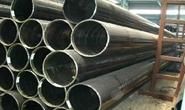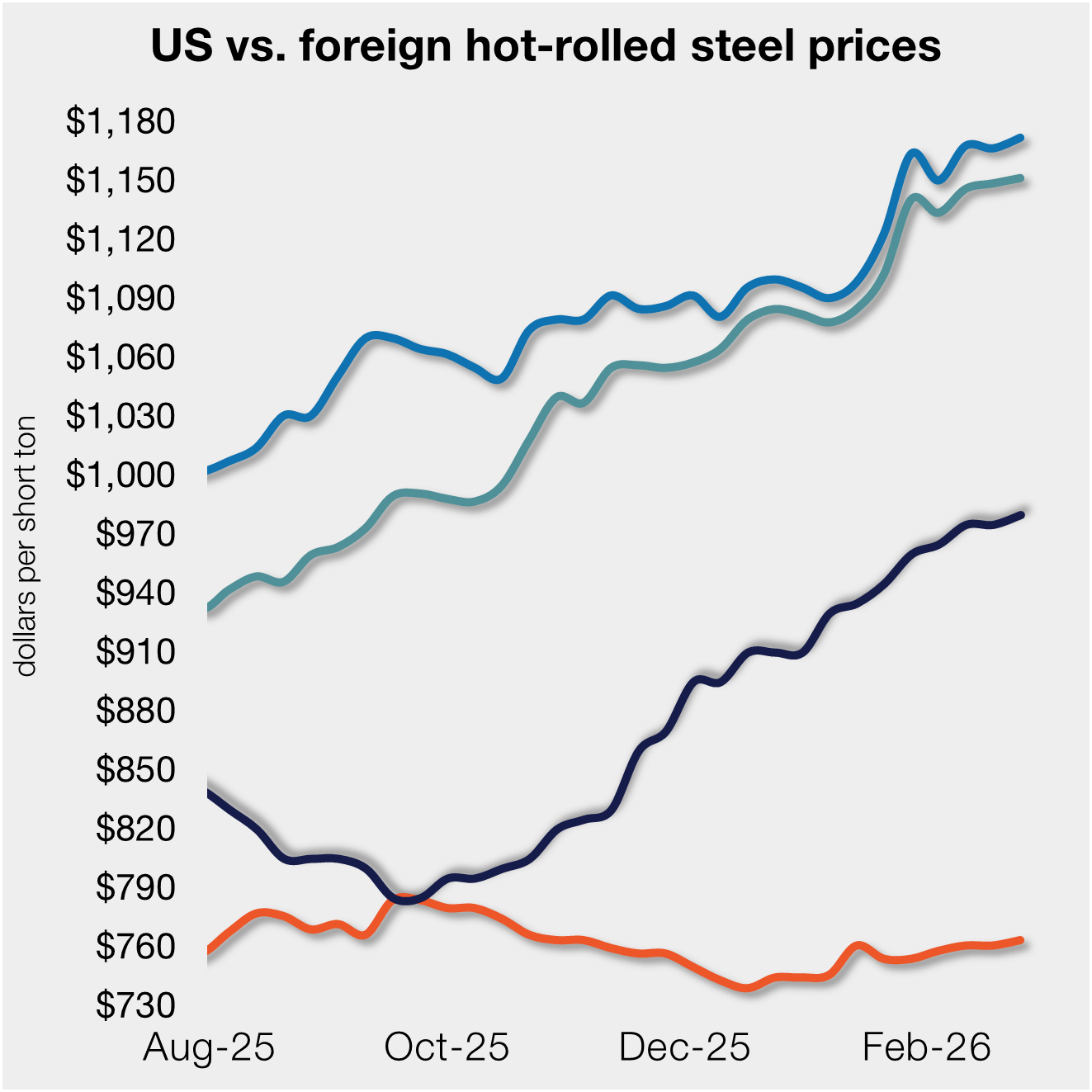Prices

June 26, 2014
Final Ruling on OCTG Imports Due on July 11
Written by Sandy Williams
Steel imports in May increased 7.4 percent from April to 4 million net tons, a 41.5 percent increase over May imports in 2013. The year-to-date total is now 17.5 million net tons, 31.7 percent higher than the same period last year.
Steel imports have been a headline issue for the steel industry in the last few years and that attention is coming to a precipice with the upcoming Commerce Department final ruling on Oil Country Tubular Goods (OCTG) imports on July 11. Preliminary data shows 1.597 million net tons of OCTG has been imported in the first five months of 2014, up 26.7 percent from same period in 2013, according to preliminary Census Bureau data and the American Iron and Steel Institute (AISI).
In July 2013, US companies filed a petition with the Department of Commerce seeking antidumping relief on OCTG imports from nine countries including South Korea. Dumping was found in all cases except for South Korea, surprising steel industry leaders. In 2012, 98.5 percent of Korean OCTG was exported to the U.S. giving Korea 24.2 a percent share of the market according to the Korea International Trade Association. Imports have continued to increase through 2013 and 2014.
Total imports of South Korean steel products reached 583,000 net tons in May 2014 with over 200,000 net tons OCTG products. Year to date, steel imports from South Korea are 35.8 percent higher than the same period in 2013, totaling 2.2 million net tons.
In a statement to the Congressional Steel Caucus in March, US Steel Corp. CEO Mario Longhi said the following:
“Earlier this year, we were disappointed that the Department of Commerce issued preliminary findings that failed to recognize and punish illegal South Korean dumping made possible through interwoven networks of related companies, all created to evade our laws and conceal the true cost of producing and importing oil country tubular goods (OCTG). The United States was founded on principles of justice, equality and fairness and it is sustained by a transparent rules-based system of law. All we ask for is a level playing field – the one our trade laws promised we would have.”
US Steel idled two tubular manufacturing facilities based on poor business conditions influenced by unfairly traded tubular products imported into the United States.
Anti-dumping rallies have been sprouting up across the nation The Alliance for American Manufacturing (AAM) hosted six rallies between May 5 and June 23. Even the “Ed Show” is focusing on trade issues and the impact of imported steel on American workers.
The Economic Policy Institute says 583,600 American steel-related jobs are at risk if the US does not fully enforce trade laws. The EPI report claims these jobs “are clearly at risk if surging imports of unfairly traded steel are allowed to supplant or replace domestic steel production.”
The Wall Street Journal reported that 38 complaints about steel imports were filed by American steelmakers in 2013.
US Senators Sherrod Brown (D-Ohio) and Rob Portman strongly advocated for trade restriction on imported OCTG urging the US International Trade Commission to “ensure that foreign producers refusing to play by the rules are not permitted to injure American workers and companies.”
In a May 16 letter to US senators, Thomas J. Gibson, president and CEO of the American Iron and Steel Institute (AISI) wrote: “In the case brought by the pipe and tube makers, the Department of Commerce failed to recognize and address the injurious dumping of OCTG by Korea and other producers.” He continued, “The U.S. government must aggressively and strictly enforce our trade laws to ensure that relief is provided to steelmakers and the nearly one million workers directly or indirectly supported by the steel industry.”
The National Association of Manufacturers also supports effective trade remedy rules. Linda Dempsey,Vice President of International Economic Affairs at NAM, told SMU:
“As indicated in the NAM’s written statement for the record for yesterday’s Senate Finance Committee hearing on trade enforcement, the NAM strongly supports the effectively, timely and consistent enforcement by the U.S. government of our trade remedy rules. These rules are an essential part of a pro-manufacturing trade policy, along with negotiating comprehensive and enforceable trade and investment agreements that level the playing field. Full enforcement of U.S. trade remedy laws during the investigatory and review stages and at the border is important to ensure that manufacturers in the United States get a fair shake in the global economy. Trade remedy rules are a globally recognized and authorized, including most prominently by the World Trade Organization agreements. While strongly supporting the trade remedy rules, the NAM does not take positions on specific cases.”
The other side of the argument
Almost all of the rhetoric is pro U.S. steel and pro trade restriction with very little opposition. The American Institute for International Steel is one organization that recognizes the increase in imports but supports continued free trade.
When the OCTG trade action was filed last year, David Phelps, former president of AIIS, called it “massive overkill.” “AIIS also believes that the current law will quickly determine that the vast majority of the targets of this massive filing have been responsible suppliers to the US market and allow the critical flow of OCTG to continue to support drilling, jobs and move our country toward American energy independence,” wrote Phelps in an AIIS statement.
In its May 2014 statement on imports AIIS wrote:
“Critics will surely offer negative interpretations of the import numbers, but there is a reason behind the increase, and it is an economically sound one. Without imports, U.S. businesses and consumers, given the spread between domestic and global prices, might have overpaid as much as several billion dollars for steel this year. This likely would have slowed capital investment and driven up prices, adding drag to the economy at the worst possible time – when GDP was already shrinking. Affordable steel from abroad is an indispensible part of a healthy American economy.”
The AIIS position on international trade as quoted from the AIIS website is as follows:
“As a result of the last 40-year effort by the domestic steel industry, the U.S. has the most protective and economically irrational trade laws in the world. Following quota protection (1960s), price controls (1970s), and absolute quotas (1980s to early 1990s), even after 20 months of Section 201 tariffs in 2002-2003, the latest protectionist weapon of choice for the U.S. steel industry is the dumping law.
“U.S. trade laws have hurt steel users, who are effectively subsidizing the domestic industry by paying higher prices that, in turn, reduce their international competitiveness. The ability of the U.S. to remain the international leader in the promotion of free trade has suffered due to the abuse of U.S. trade laws by the domestic steel industry. This has also resulted in some trade partners adopting “copy-cat” trade law regimes that have punished internationally competitive export industries of the U.S. home countries have directly retaliated against U.S. exports via WTO approved sanctions. Revision of our trade laws will not only benefit the steel sector, but also many other U.S. industries who have seen their ability to compete in international markets hurt indirectly by the irrational and abusive U.S. trade laws.
“AIIS believes a dumping law should only punish truly predatory behavior, not normal commercial behavior stemming from market conditions that require all sellers to offer their products at less than full cost of production.”
In contrast, the AISI position, as stated on their website, is as follows:
“Steel and other U.S. manufacturers continue to face significant trade and competitiveness challenges from foreign government trade-distorting policies and practices, including in particular China’s state-owned form of capitalism. A more effective U.S. trade policy is needed to combat these foreign unfair trade practices, level the playing field, and preserve and strengthen our nation’s manufacturing base. The U.S. Government must keep our laws against unfair trade strong; strictly enforce trade laws and agreements; use all means to prevent and address unfair trade and injurious import surges; and expand rules-based trade through existing and new trade agreements.”
AIIS does agree with AISI on the issue of subsidies. AIIS believes “subsidies are trade distortions” and opposes them in foreign countries but it also opposes them for the US steel industry.
The “Buy American” policy is also a point of contention between AIIS and AISI, and most U.S. union organizations. AIIS says “Buy America” is protectionism. “For the full benefit of open competition in government procurement to be realized, AIIS calls on the U.S. to eliminate this last bastion of protectionism in government procurement.”
AIIS does not promote the unrestrained influx of imported products from abroad, but says it supports “trade-liberalizing agreements such as NAFTA, GATT, and WTO, with a special focus on the elimination of steel tariffs and especially making the U.S. trade laws more commercially rational.”
“We believe that the WTO anti-dumping rules should revert to the original intent; that antidumping measures should be applied only based on an international standard that protects domestic industries only from truly predatory practices so that there is no discrimination between domestic suppliers and exporters/importers for the same commercial pricing decisions in a given market,” states AIIS on its website.
SMU Note: The issue of foreign imports is one which is not going away in the immediate future. We have arranged to have two of the lead attorneys representing opposing sides of the import question to speak at our September 3 & 4 Steel Summit Conference in Atlanta. Attorney Roger Schagrin represents the domestic steel industry in trade cases and Attorney Lewis Leibowitz represents the consumer. Combined with Paul Lowrey of Steel Research Associates who will provide background on foreign imports this segment of our conference promises to be one not to miss. You can find details about our program and how to register for our conference on our website: www.SteelMarketUpdate.com







